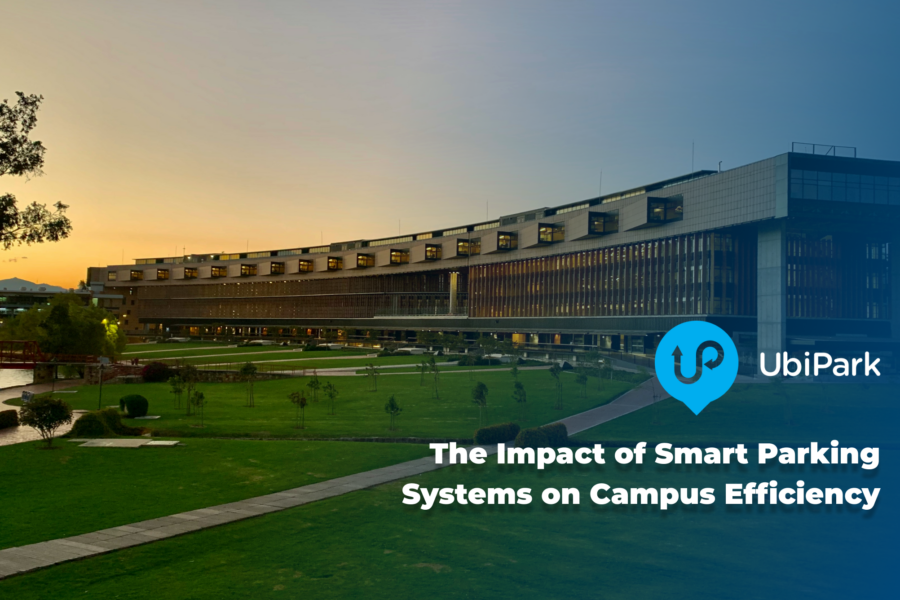The Impact of Smart Parking Systems on Campus Efficiency

June 20, 2024
Smart parking systems, like UbiPark, are transforming the way universities manage their parking facilities, significantly boosting campus efficiency. These innovative systems integrate advanced technologies, such as sensors, data analytics, and mobile applications to provide real-time information and streamline parking operations. The impact of these systems is multifaceted, enhancing not only the convenience and satisfaction of students, staff, and visitors but also contributing to the overall efficiency and sustainability of the campus environment.
Real-Time Data and Improved Space Utilisation
One of the most significant benefits of smart parking systems is their ability to provide real-time data on parking availability. Sensors installed in parking spots detect whether a space is occupied or vacant, transmitting this information to a central system. This data is then made accessible to users through mobile apps or digital displays, guiding drivers to available spots quickly and efficiently. This reduces the time spent searching for parking, which can often be a frustrating and time-consuming process, especially during peak hours.
By optimising the use of available spaces, universities can accommodate more vehicles without the need to expand parking facilities. This improved utilisation is particularly beneficial in urban campuses where space is limited and expensive. Efficient space management also means that fewer parking spots remain underutilised, maximising the return on investment for the university’s parking infrastructure.
Reduced Traffic Congestion and Environmental Impact
Smart parking systems help alleviate traffic congestion on campus by directing drivers to available spots, thereby reducing the circulation of vehicles searching for parking. This not only enhances the flow of traffic but also decreases the emission of pollutants, contributing to a cleaner and healthier campus environment. The reduction in vehicle idling time and lower emissions align with sustainability goals, making campuses more eco-friendly.
Moreover, the data collected by smart parking systems can be analysed to identify patterns and trends in parking usage. This information enables university administrators to make informed decisions about traffic management and campus planning. For example, if certain areas consistently experience high demand, the university can consider additional measures such as expanding those facilities or promoting alternative transportation options in those zones.
Enhanced User Experience
The convenience offered by smart parking systems significantly improves the user experience for students, faculty, and visitors. Mobile apps associated with these systems provide features such as real-time parking availability, navigation to the nearest vacant spot, and even the ability to reserve a parking space in advance. Some systems also offer payment integration, allowing users to pay for parking through the app, thereby, eliminating the need for cash transactions and reducing wait times at payment kiosks.
The enhanced user experience extends beyond mere convenience. It also contributes to a positive perception of the university as a modern, tech-savvy institution that values the time and comfort of its community. This can be a differentiating factor in attracting prospective students and faculty, who are increasingly looking for campuses that offer advanced amenities and support services.
Streamlined Operations and Cost Savings
For university administrators, smart parking systems provide a more streamlined and efficient way to manage parking operations. Automated systems reduce the need for manual monitoring and enforcement, freeing up staff to focus on other critical tasks. The data-driven insights gained from these systems allow for better planning and allocation of resources, ensuring that parking facilities are maintained and utilised effectively.
Cost savings are another significant advantage. While the initial investment in smart parking technology can be significant, the long-term benefits often outweigh the costs. Reduced operational expenses, decreased need for physical expansions, and enhanced revenue collection through efficient space utilisation and automated payment systems contribute to a favourable return on investment.
Implement smart campus parking with UbiPark
Smart parking systems have a profound impact on campus efficiency and are already making waves on Australian and global campuses. Ready to lead the charge and place your university campus in a position to grow? Contact us to get started.




